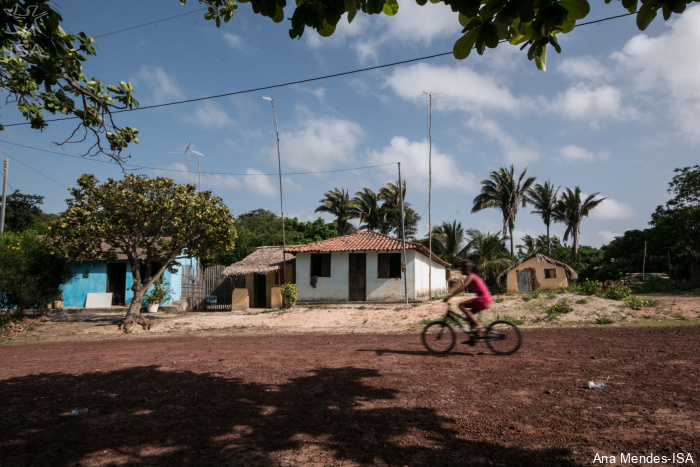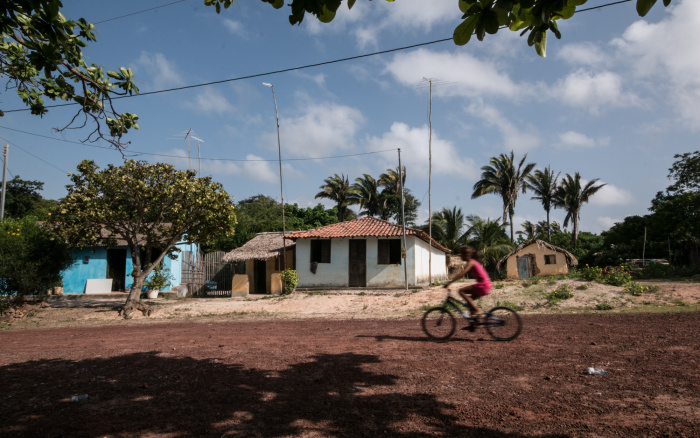Você está na versão anterior do website do ISA
Atenção
Essa é a versão antiga do site do ISA que ficou no ar até março de 2022. As informações institucionais aqui contidas podem estar desatualizadas. Acesse https://www.socioambiental.org para a versão atual.
Conaq and ISA launch ‘Covid-19 Observatory in Quilombos'
Thursday, 28 de May de 2020 
Esta notícia está associada ao Programa:
Digital platform which disseminates accurate information and up-to-date data about the spread of COVID-19 in quilombola territories throughout Brazil

Covid-19 Observatory in Quilombos (https://quilombosemcovid19.org/) is an online platform that collects epidemiological data documenting the spread of the novel coronavirus pandemic in quilombola communities across Brazil.
The monitoring project, conducted by the Coordenação Nacional de Articulação das Comunidades Negras Rurais Quilombolas (Conaq) and the Instituto Socioambiental (ISA), publishes confirmed cases and deaths resulting from COVID-19 among quilombolas.
To date, 185 cases and 45 deaths from Covid-19 have been recorded in quilombo communities across Brazil. Since the first recorded death, one quilombola has died per day.
So far, Pará is the state with the highest number of confirmed deaths: 15. Amapá is second with nine confirmed deaths, followed by Pernambuco with seven and Rio de Janeiro with six.
Conaq has drawn attention to the alarming structural factors that have contributed to the spread of the pandemic in quilombola territories.
Health departments, including the Ministry of Health, have not given sufficient attention to black communities. Covid-19 transmission data in quilombola territories are underreported. Many municipal health departments have failed to report contamination and death figures among quilombolas, as well.
“Conaq is concerned about measuring the real impact of Covid-19 on quilombolas, given the underreporting (of COVID-19 cases) by the Brazilian State, the lack of enforcement of quilombolas’ constitutional rights, and the titling of their territories. The lack of access to public policies is a major obstacle in the fight to contain the novel coronavirus, which requires basic conditions of hygiene, as well as territorial and food security,” said Sandra Maria Andrade, coordinator of Conaq.
“The majority of quilombola territories are located far from structured hospitals and reside close to municipalities where health care has been underfunded and where even rapid tests are unavailable. Once again, deliberately, the quilombola population of Brazil is thrust into oblivion, rendered invisible, and excluded from public policies. In this sense, the platform aims to disseminate information in a space that can be updated frequently,” she added.
For more visibility and information
By furnishing substantiated data on confirmed cases and deaths, the Covid-19 Observatory in the Quilombos has become a tool to combat structural racism by generating visibility and information.
The platform is updated with information sent by Conaq’s regional offices, which monitor confirmed cases and deaths in the communities with the assistance of local organizations that operate in the territories.
In partnership with Conaq, these groups send the data to ISA’s team, which is responsible for managing the website, as well as systematizing and updating the information. The database for the territories draws from the Brazilian Institute of Geography and Statistics (IBGE), which has identified 5,972 quilombola territories throughout the country. Conaq identifies 6,330 quilombola territories.
“Conaq's initiative to monitor Covid-19 cases in quilombos is extremely important for the movement and for Brazilian society as a whole. The State does not fulfill its obligations and does not have specific information regarding racial demographic data, demonstrating their disregard for the black population, which is the majority in this country - 54%,” said Milene Maia Oberlaender, and ISA advisor.
With the updated information, Brazilian society and especially quilombola communities will have more information to demand action from the State to take concrete measures to defend the lives of quilombola families.
The inequality in confronting the novel coronavirus, which is already evident in urban peripheries, will have a devastating impact on quilombos if the State does not act swiftly and the virus retains its current rate of deadly transmission.
Many communities have reported a lack of assistance and the need to travel great distances to better equipped health centers, as the Public Health System (SUS) does not give special attention to the quilombola population.
The black population is already subject to many health disparities that exacerbate the effects of Covid-19, such as diabetes and high blood pressure. Precarious access to clean water in many territories is another cause for concern, as it hinders the hygienic conditions necessary to contain the spread of the virus.
This situation has worsened exponentially as a result of the social and economic impact of the Covid-19 crisis on the everyday lives of quilombola families.
The Covid-19 Observatory platform in Quilombos is supported by the Moore Foundation, Norwegian Embassy, European Union, Good Energies, and Rainforest Foundation Norway.
Translation: Edward Shore
Roberto Almeida
ISA
Imagens:


